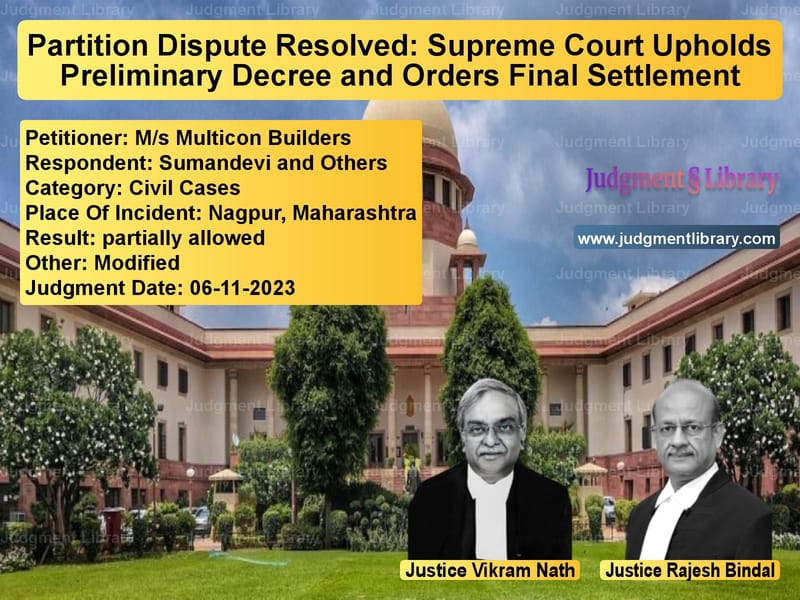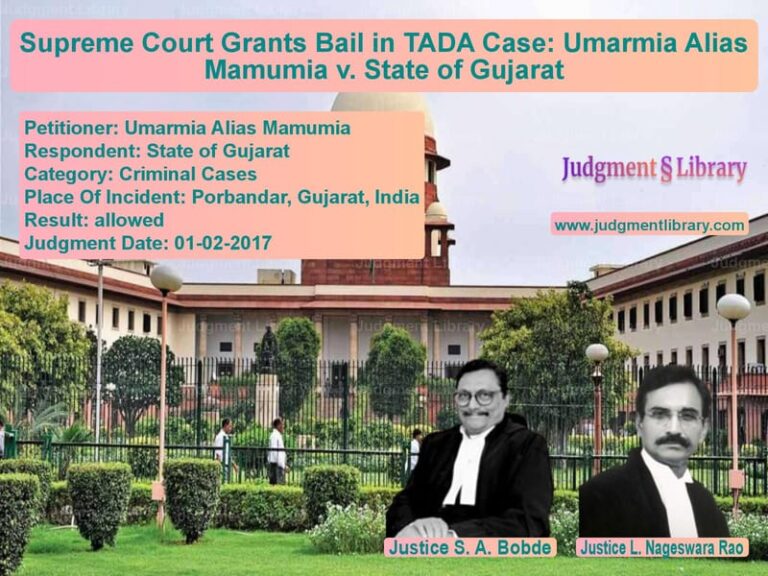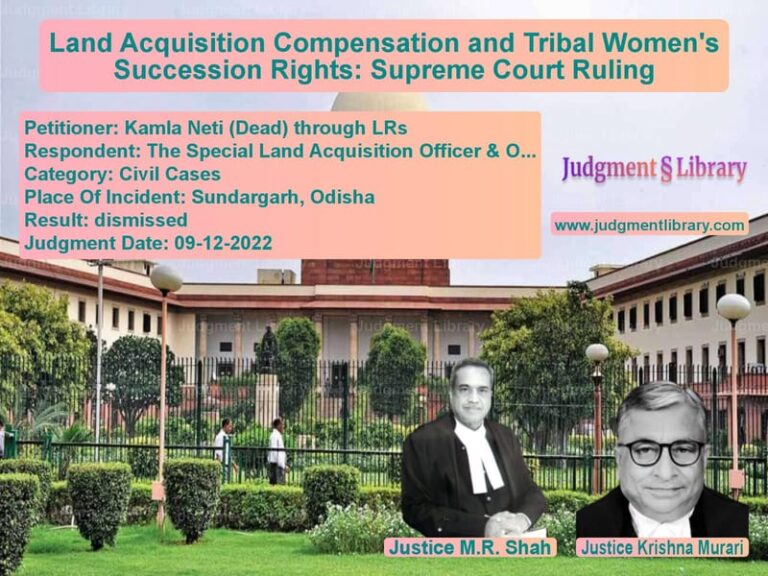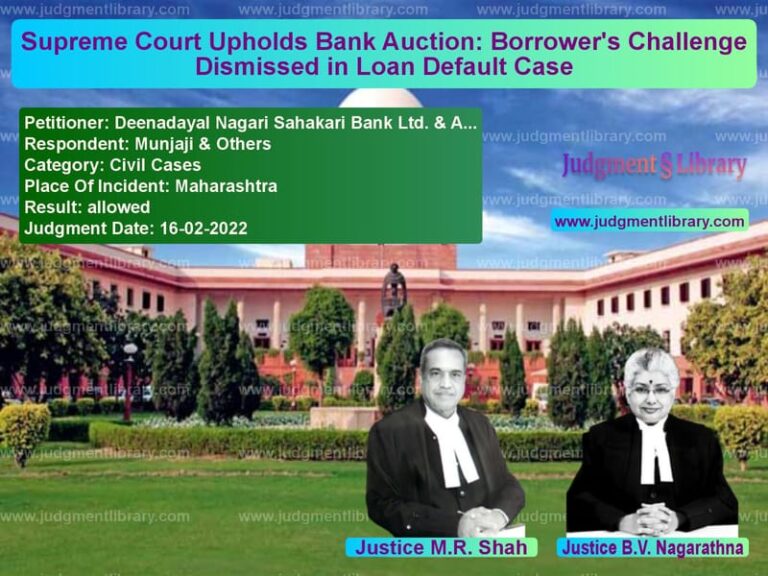Partition Dispute Resolved: Supreme Court Upholds Preliminary Decree and Orders Final Settlement
The case of M/s Multicon Builders vs. Sumandevi and Others revolves around a long-standing partition dispute concerning family property. The Supreme Court examined whether the preliminary decree passed by the trial court and upheld by the High Court required intervention. The Court ultimately ruled that the preliminary decree should stand, and the final decree should be passed expeditiously while considering all legal aspects of partition.
Background of the Case
The dispute arose from a civil suit for declaration, partition, and separate possession of a family property. The suit was filed by Sheela, the widow of Narendra Fiske. In response, certain defendants filed a counterclaim, asserting their rights over the property.
The trial court passed a preliminary decree on February 27, 2012, determining the shares of the plaintiff and defendants (Nos. 1 to 8). The decree restrained the defendants from alienating the suit property until the partition was completed. However, it also held that Defendant No. 9 (the appellant, M/s Multicon Builders) had no right, title, or claim over the property. The defendants were directed to demolish any unauthorized construction raised in violation of municipal laws.
The preliminary decree was not challenged by the original family members (plaintiff and Defendants Nos. 1 to 8). However, Defendant No. 9, M/s Multicon Builders, filed an appeal before the High Court, challenging the decision on the ground that its rights were adversely affected.
The High Court dismissed the appeal but modified the trial court’s order by directing that Defendants Nos. 2 and 9 must demolish the unauthorized construction immediately. This led to the present appeal before the Supreme Court.
Petitioner’s Arguments
M/s Multicon Builders, the appellant, contended:
- That it had acquired rights in the property through Defendant No. 2, Chandrashekhar Deshmukh, who had transferred his share to them.
- That the preliminary decree was prejudicial to its interests as it had invested a significant amount in developing a commercial complex on the disputed land.
- That demolishing the construction at this stage would cause irreparable loss, as the final decree had not yet been passed.
- That its rights, as a third party claiming through a co-sharer, should have been considered separately and protected during the partition process.
Respondent’s Arguments
The original plaintiffs and other defendants (Nos. 1 to 8) countered:
- The preliminary decree was already finalized, and none of the original family members challenged it.
- M/s Multicon Builders had no independent right in the property beyond what was transferred by Defendant No. 2, whose share was yet to be demarcated.
- The construction undertaken by M/s Multicon Builders was in violation of municipal laws and could not be protected under partition law.
- Demolition was necessary because unauthorized construction could complicate the final decree proceedings.
Key Legal Issues Considered
1. Whether a Third Party Claiming Through a Co-Sharer Can Challenge a Preliminary Decree
The Court examined whether a third party (like M/s Multicon Builders) claiming through a co-sharer (Defendant No. 2) had the legal standing to challenge a preliminary decree that had already been accepted by the original parties.
2. Whether Unauthorized Construction Can Be Protected in Partition Cases
The Court considered whether the commercial complex built by M/s Multicon Builders could be allowed to remain or if it should be demolished as per the trial court’s directions.
3. Whether the Final Decree Proceedings Could Provide Relief to the Appellant
The Court analyzed whether M/s Multicon Builders could seek relief during the final decree proceedings instead of challenging the preliminary decree.
Supreme Court’s Verdict
The Supreme Court upheld the preliminary decree and dismissed the appeal but made the following key observations:
- M/s Multicon Builders had no independent right to challenge the preliminary decree since the original co-sharers did not contest it.
- The commercial complex constructed by M/s Multicon Builders could be considered during the final decree proceedings.
- The trial court should consider the implications of demolition during the final decree and decide whether it was in the best interest of all parties.
- The order of the High Court directing immediate demolition was modified to allow reconsideration at the final decree stage.
- The trial court was directed to expedite the final decree proceedings to ensure a fair and just partition.
Key Takeaways from the Judgment
- Third Parties Cannot Challenge Preliminary Decrees: A person claiming through a co-sharer has no independent right to contest a partition decree unless they were a direct party to the original suit.
- Final Decree Proceedings Are Crucial: The Supreme Court emphasized that issues like unauthorized construction and equitable division should be addressed in the final decree stage.
- Unauthorized Construction May Be Reconsidered: Instead of immediate demolition, the Court allowed the trial court to reconsider the issue during the final decree process.
- Partition Must Follow Legal Principles: The Court reaffirmed that family partitions must be conducted legally, ensuring that no party gains an unfair advantage.
The ruling reinforces the principle that third parties cannot interfere in family partitions unless they have an independent legal claim. It also highlights the importance of final decree proceedings in determining the ultimate division of property and resolving disputes over unauthorized construction.
Petitioner Name: M/s Multicon Builders.Respondent Name: Sumandevi and Others.Judgment By: Justice Vikram Nath, Justice Rajesh Bindal.Place Of Incident: Nagpur, Maharashtra.Judgment Date: 06-11-2023.
Don’t miss out on the full details! Download the complete judgment in PDF format below and gain valuable insights instantly!
Download Judgment: ms-multicon-builder-vs-sumandevi-and-others-supreme-court-of-india-judgment-dated-06-11-2023.pdf
Directly Download Judgment: Directly download this Judgment
See all petitions in Property Disputes
See all petitions in Specific Performance
See all petitions in Judgment by Vikram Nath
See all petitions in Judgment by Rajesh Bindal
See all petitions in partially allowed
See all petitions in Modified
See all petitions in supreme court of India judgments November 2023
See all petitions in 2023 judgments
See all posts in Civil Cases Category
See all allowed petitions in Civil Cases Category
See all Dismissed petitions in Civil Cases Category
See all partially allowed petitions in Civil Cases Category







